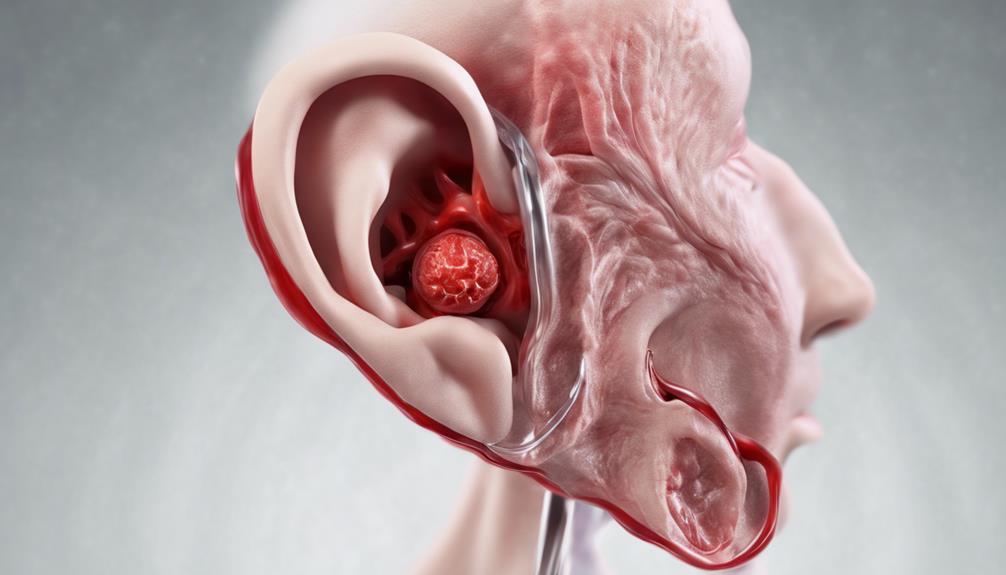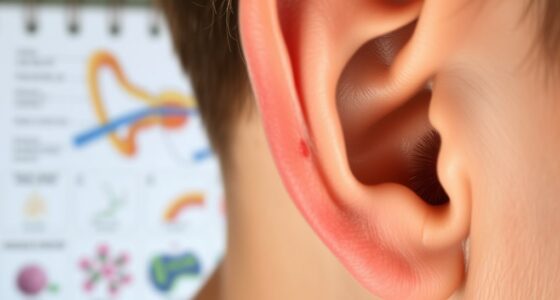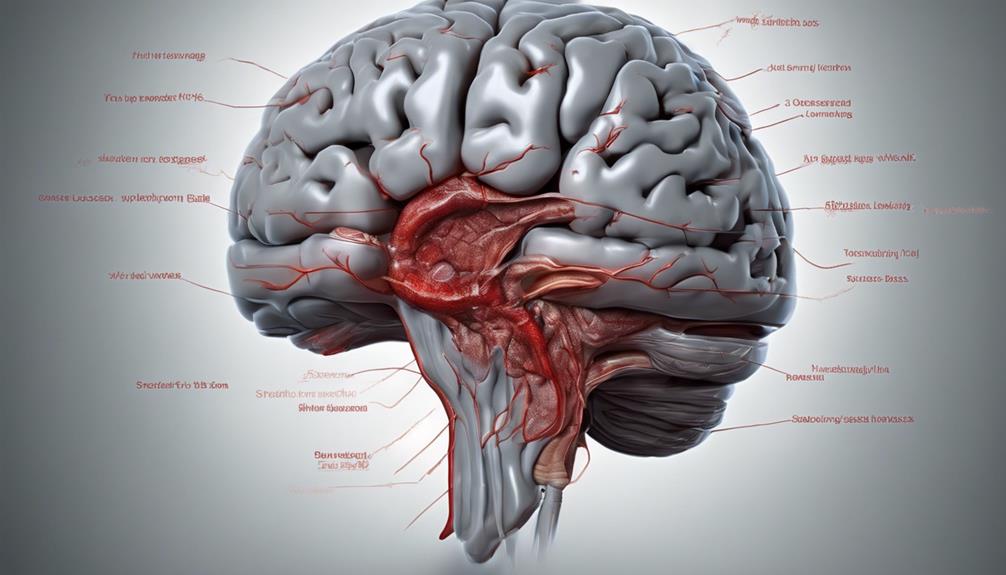Exploring the intricate connection between anemia and hearing loss reveals a subtle balance of health impacts. The subtle interaction between these two conditions, which may seem unrelated at first glance, prompts us to consider the unseen links that tie them together.
As we peel back the layers of this complex relationship, a deeper understanding emerges, hinting at potential avenues for intervention and prevention. Join us on this journey as we uncover the hidden harmony between anemia and hearing loss, shedding light on a compelling narrative that transcends traditional healthcare boundaries.
Key Takeaways
- Anemia, especially IDA, impacts oxygen supply crucial for inner ear function.
- Ischemic damage from IDA harms nerves and hair cells in the inner ear.
- Oxygen deprivation due to anemia affects blood supply to inner ear structures.
- Preventing anemia-induced hearing loss requires addressing blood supply issues effectively.
Understanding Anemia and Its Impact
Anemia, characterized by low red blood cell levels, poses a significant threat to the auditory system due to the resulting oxygen deprivation it causes. Iron deficiency anemia (IDA), a prevalent form of anemia, can have profound implications for hearing health. In IDA, the decreased levels of red blood cells limit the amount of oxygen transported to the inner ear. This oxygen deprivation can impair the proper function of the delicate structures within the auditory system, potentially leading to hearing loss.
The inner ear, responsible for converting sound waves into electrical signals that the brain interprets as sound, is highly sensitive to changes in oxygen levels. When oxygen supply is compromised due to IDA, the inner ear's ability to perform this crucial function may be compromised, contributing to hearing difficulties.
Furthermore, the systemic effects of IDA, such as fatigue and weakness, underscore the widespread impact that anemia can have on the body, including the auditory system. Addressing anemia, particularly IDA, through interventions like iron supplementation or dietary adjustments, may play a vital role in preventing or ameliorating associated hearing loss.
The Connection Between Anemia and Hearing

Iron deficiency anemia impacts the auditory system by affecting the oxygen supply to the inner ear. The inner ear, crucial for hearing, relies on a rich blood supply for its normal function. When an individual is anemic, the blood supply to the inner ear may be compromised, leading to ischemic damage. This damage can harm the delicate nerves and hair cells within the inner ear, which are essential for converting sound vibrations into electrical signals that the brain can interpret.
Research has shown a clear association between iron deficiency anemia and sensorineural hearing loss, a type of hearing impairment that originates in the inner ear or the neural pathways. Therefore, the connection between anemia and hearing loss lies in the anemia-induced oxygen deprivation that can result in detrimental effects on the blood supply to the inner ear structures, ultimately impacting auditory function.
Mechanisms of Anemia-Induced Hearing Loss
Insufficient oxygen delivery to the inner ear due to anemia can lead to detrimental effects on auditory function, primarily by causing ischemic damage to the delicate structures responsible for hearing. The inner ear, crucial for translating sound waves into neural signals, requires a constant and adequate blood supply to maintain its functions.
When anemia lowers hemoglobin levels, the cochlear area within the inner ear becomes more vulnerable to damage due to reduced oxygen availability. This deficiency in oxygen delivery can result in ischemic damage to the sensitive tissues of the inner ear, affecting its ability to process sound effectively. The association between anemia and hearing loss highlights the importance of addressing blood supply issues to prevent anemia-induced hearing loss.
Preventive Measures for Anemia-Related Hearing Loss

To prevent anemia-related hearing loss, maintaining sufficient iron levels through a diet rich in iron-containing foods like red meat, spinach, and lentils is crucial. Combining these foods with vitamin C can enhance iron absorption, supporting the prevention of anemia-induced hearing issues.
Regular blood tests to monitor iron levels are essential in preventing anemia-related hearing loss and ensuring optimal health. When aiming to prevent anemia-related hearing issues, it's important to avoid consuming tea or coffee during iron-rich meals as these beverages can inhibit iron absorption.
Proper diagnosis of iron deficiency anemia through blood tests is the first step in effective treatment. If necessary, iron supplementation may be recommended to restore iron levels and prevent anemia-induced hearing loss. By following these preventive measures, individuals can take proactive steps to maintain adequate iron levels, promoting overall health and reducing the risk of anemia-related hearing issues.
Managing Hearing Loss Caused by Anemia
Treating iron deficiency through oral iron supplementation is a key aspect of managing hearing loss caused by anemia. Early diagnosis and treatment of anemia can't only improve overall health status but also potentially benefit individuals with hearing loss. Maintaining a balanced diet with sufficient iron intake is crucial for supporting both physical and hearing health. Efforts to diagnose and treat anemia effectively could play a vital role in preventing or mitigating the impact of hearing loss. Further research is necessary to determine the effectiveness of iron supplementation in enhancing the hearing status of individuals with anemia.
- Oral Iron Supplementation: Essential for addressing iron deficiency anemia.
- Balanced Diet: Crucial for supporting physical and hearing health.
- Early Diagnosis: Important for improving overall health status and managing hearing loss.
- Effective Treatment: Can potentially prevent or reduce the impact of hearing loss.
- Research Needs: Further studies required to ascertain the effectiveness of iron supplementation in improving hearing health.
Frequently Asked Questions
Can Anemia Cause Hearing Loss?
Yes, anemia can cause hearing loss. Reduced oxygen supply to the inner ear due to iron deficiency anemia can lead to sensorineural hearing loss in adults.
Lack of iron affects the cochlear area's blood supply, making it vulnerable to ischemic damage that impacts hearing. Individuals with this condition may face an increased risk of combined hearing loss.
Understanding these mechanisms is crucial for timely diagnosis and treatment.
What Should You Not Drink if You Are Anemic?
We should avoid drinking tea or coffee with iron-rich meals if we're anemic. These beverages contain tannins that can hinder the absorption of non-heme iron from plant sources.
Opting for water or fruit juices instead can help maximize iron absorption. Being mindful of what we drink can support our bodies in overcoming iron deficiency anemia and ensuring proper utilization of iron for overall health.
What Are the 3 Stages of Iron Deficiency?
Sure thing! Iron deficiency progresses through three stages: depletion, pre-anemia, and iron deficiency anemia.
Depletion stage depletes iron stores but keeps hemoglobin levels normal.
Pre-anemia stage drops iron levels, causing fatigue.
Iron deficiency anemia impairs red blood cell production, leading to symptoms like pallor and dizziness.
These stages impact oxygen delivery to tissues, potentially affecting various bodily functions, including hearing.
What Is the Life Expectancy of Someone With Anemia?
We must consider various factors when determining the life expectancy of someone with anemia. The severity of the condition, underlying causes, and timely treatment all impact outcomes.
Severe anemia, if left untreated, can lead to complications affecting life expectancy. Proper management through treatment and addressing root causes can improve outcomes.
Regular monitoring, treatment adherence, and lifestyle adjustments are key in determining the life expectancy of individuals with anemia.
Conclusion
In conclusion, the intricate relationship between iron deficiency anemia and hearing loss sheds light on the importance of early detection and treatment.
By understanding the mechanisms linking these conditions, we can take preventive measures to potentially mitigate the risks of hearing impairment.
Further research into this correlation is crucial for improving health outcomes and enhancing our understanding of how anemia can impact our hearing.
Stay informed, stay proactive, and prioritize your health.










